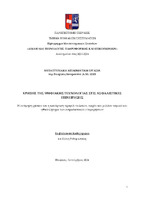| dc.contributor.advisor | Ρεθυμιωτάκη, Ελένη | |
| dc.contributor.author | Κουρκούτα, Γεωργία | |
| dc.date.accessioned | 2024-10-09T05:28:50Z | |
| dc.date.available | 2024-10-09T05:28:50Z | |
| dc.date.issued | 2024-09 | |
| dc.identifier.uri | https://dione.lib.unipi.gr/xmlui/handle/unipi/16830 | |
| dc.identifier.uri | http://dx.doi.org/10.26267/unipi_dione/4252 | |
| dc.description.abstract | H παρούσα εργασία πραγματεύεται τη χρήση των ψηφιακών τεχνολογιών στις ασφαλιστικές επιχειρήσεις καθώς και την εκτίμηση κινδύνου και την κατάρτιση προφίλ πελατών υπό το πρίσμα εθνικού και ενωσιακού δικαίου. Για συστημικούς λόγους, χωρίζεται σε τρία κεφάλαια. Στο πρώτο κεφάλαιο επιχειρείται να αποδοθεί όσο το δυνατόν ευκρινέστερα η εικόνα για τον ψηφιακό μετασχηματισμό στις ασφαλιστικές επιχειρήσεις. Γίνεται μία εισαγωγή στην έννοια του ψηφιακού μετασχηματισμού, στη λειτουργία των ασφαλιστικών επιχειρήσεων και στην μέχρι σήμερα επιρροή της από αυτόν καθώς και μία συγκεντρωτική, θεωρητική αναφορά των νομικών ζητημάτων και των ηθικών προκλήσεων που αφορούν την ασφαλιστική οικονομία των δεδομένων. Εν συνεχεία ακολουθεί το δεύτερο κεφάλαιο, χωριζόμενο σε επιμέρους κεφάλαια, το οποίο αποτελείται από τις πιο πολυσυζητημένες καινοτομίες της ψηφιακής τεχνολογίας (Blockchain, Internet of Things και Big Data αντιστοίχως). Σε καθένα από τα υποκεφάλαια γίνεται απόπειρα να παρουσιαστεί η εκάστοτε τεχνολογία καθώς και η χρήση της (υπάρχουσα ή προσδοκώμενη) στις ασφαλιστικές επιχειρήσεις. Το τρίτο κεφάλαιο αφορά την Τεχνητή Νοημοσύνη, η οποία, λόγω της άμεσης σύνδεσής της με την προαναφερθείσα εκτίμηση ρίσκου και κατάρτιση προφίλ τίθεται χωριστά από τις υπόλοιπες ψηφιακές τεχνολογίες. Αναλύονται κυρίως εισαγωγικές και βασικές πληροφορίες για την Τεχνητή Νοημοσύνη, γίνεται ειδική μνεία για την κατάρτιση προφίλ μέσω αλγορίθμων και την χρήση στον χρηματοπιστωτικό τομέα, με παράλληλη παράθεση παραδειγμάτων από τη νομολογία και γίνεται απόπειρα παρουσίασης των ορίων που θα πρέπει να τηρούνται σε αυτή βάσει εθνικών και ενωσιακών νόμων. Μετά την ανάλυση αυτή, ακολουθεί παρενθετικά υποενότητα στην οποία παρουσιάζονται σκέψεις ως προς το αν η Τεχνητή Νοημοσύνη και ο αλγόριθμος μπορεί να συμβαδίσει με την ηθική και την δικαιοσύνη καθώς και την ισορροπία που χρειάζεται ανάμεσα στην προστασία του καταναλωτή και την προστασία του επιχειρείν από την πλευρά των επιχειρήσεων με γνώμονα τον μετασχηματισμό και στο πεδίο του ανταγωνισμού προς μία πράσινη οικονομία, μεταβολή άμεσα συνδεόμενη με τον ψηφιακό μετασχηματισμό. Ακολουθεί ο επίλογος και οι βιβλιογραφικές παραπομπές. | el |
| dc.format.extent | 93 | el |
| dc.language.iso | el | el |
| dc.publisher | Πανεπιστήμιο Πειραιώς | el |
| dc.rights | Αναφορά Δημιουργού-Μη Εμπορική Χρήση-Όχι Παράγωγα Έργα 3.0 Ελλάδα | * |
| dc.rights.uri | http://creativecommons.org/licenses/by-nc-nd/3.0/gr/ | * |
| dc.title | Χρήσεις της ψηφιακής τεχνολογίας στις ασφαλιστικές επιχειρήσεις - Η εκτίμηση ρίσκου και η κατάρτιση προφίλ πελατών, παρόν και μέλλον νομικό και ηθικό ζήτημα των ασφαλιστικών επιχειρήσεων | el |
| dc.type | Master Thesis | el |
| dc.contributor.department | Σχολή Τεχνολογιών Πληροφορικής και Επικοινωνιών. Τμήμα Ψηφιακών Συστημάτων | el |
| dc.description.abstractEN | This paper addresses the use of digital technologies in insurance companies, as well as risk assessment and customer profiling, under the lens of national and European Union law. For structural reasons, it is divided into three chapters. In the first chapter, an attempt is made to provide as clear as possible a view of the digital transformation in insurance companies. It introduces the concept of digital transformation, the operation of insurance companies, and the influence of digitalization in the sector thus far. Furthermore, it provides a concise theoretical reference to the legal issues and ethical challenges concerning the insurance data economy. Next follows the second chapter, divided into subsections, which consists of the most discussed innovations in digital technology (Blockchain, Internet of Things, and Big Data, respectively). In each subsection, an attempt is made to present the respective technology, as well as its use (current or anticipated) in the insurance industry. The third chapter deals with Artificial Intelligence, which, due to its direct connection with the aforementioned risk assessment and customer profiling, is addressed separately from the other digital technologies. The chapter primarily analyzes introductory and basic information about Artificial Intelligence, with a special reference to profiling through algorithms and its use in the financial sector, while providing examples from case law. Additionally, there is an attempt to outline the boundaries that should be adhered to in this context based on national and European laws. Following this analysis, there is an interposed subsection that presents thoughts on whether Artificial Intelligence and algorithms can align with ethics and justice, as well as the balance needed between consumer protection and the protection of business interests, with the business perspective focusing on transformation and competition towards a green economy—a change closely tied to digital transformation. The conclusion and the bibliographical references follow. | el |
| dc.contributor.master | Δίκαιο και Τεχνολογίες Πληροφορικής και Επικοινωνιών (MSc in Law and Information and Communication Technologies) | el |
| dc.subject.keyword | Ψηφιακός μετασχηματισμός, | el |
| dc.subject.keyword | Ασφαλιστικές επιχειρήσεις | el |
| dc.subject.keyword | Κατάρτιση προφίλ | el |
| dc.subject.keyword | AML/FT | el |
| dc.subject.keyword | GDPR | el |
| dc.subject.keyword | Blockchain | el |
| dc.subject.keyword | Big data analytics | el |
| dc.subject.keyword | Τεχνητή νοημοσύνη | el |
| dc.subject.keyword | Internet of Things | el |
| dc.subject.keyword | Ψηφιακή ηθική | el |
| dc.date.defense | 2024-10-02 | |



